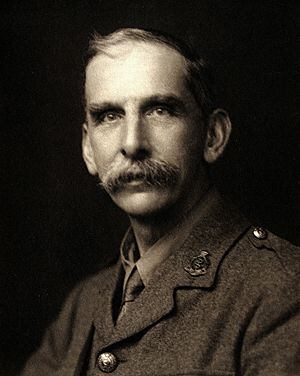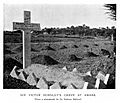Victor Horsley facts for kids
Quick facts for kids
Sir Victor Horsley
|
|
|---|---|
 |
|
| Born |
Victor Alexander Haden Horsley
14 April 1857 Kensington, London, England
|
| Died | 16 July 1916 (aged 59) Amarah, Iraq
|
| Education | Cranbrook School, Kent University College London |
| Known for | Pioneering work in neuroscience |
| Medical career | |
| Profession | Surgeon, physician |
| Institutions | University College Hospital< Brown Institute National Hospital for Paralysis and Epilespsy |
| Sub-specialties | neurosurgery |
| Research | epilepsy myxedema cretinism trigeminal neuralgia |
| Awards | Knighthood Cameron Prize for Therapeutics of the University of Edinburgh (1893) Royal Medal (1894) |
Sir Victor Alexander Haden Horsley (born April 14, 1857 – died July 16, 1916) was a brilliant British scientist and doctor. He is famous for his groundbreaking work in brain and nerve surgery.
Victor was born in Kensington, London. He studied medicine at University College London and in Germany. In 1881, he began his career as a surgeon at the University College Hospital. He later became a professor at University College London. Victor also strongly supported women's suffrage, which meant women getting the right to vote.
Contents
About Victor Horsley
Victor Alexander Haden Horsley was the son of John Callcott Horsley, a famous artist. Queen Victoria herself gave him his first names, Victor Alexander.
In 1887, Victor married Eldred Bramwell. They had two sons, Siward and Oswald, and a daughter, Pamela. In 1902, King Edward VII made him a knight. This meant he could use "Sir" before his name.
Victor was known for his kindness and generous spirit. He cared deeply about helping others. He worked hard to improve medical care for everyone. He also supported women's rights.
Medical Discoveries
Victor Horsley was a pioneer in surgery and how the body works. He was the first doctor to remove a spinal tumor in 1887. This was a huge step forward in medicine.
He also created many new ways to perform brain and nerve surgery. These included using bone wax to stop bleeding during operations. He also developed a special way to cut the trigeminal nerve to treat severe face pain.
Brain and Nerve Studies
Horsley studied how the brain works in both animals and humans. He focused on the cerebral cortex, which is the outer layer of the brain. His research showed how different parts of the brain control movement.
He was a pioneer in using electricity to find the exact spot in the brain causing epilepsy. This helped surgeons remove only the affected part. This method is still used today.
Thyroid Gland Research
Victor Horsley also studied the thyroid gland. This gland makes hormones that control how the body uses energy. He researched conditions like myxedema and cretinism. These are caused by low thyroid hormone levels.
He showed that these conditions could be treated with thyroid gland extracts. He did this by experimenting with monkeys. This was a major discovery for treating these diseases.
Other Medical Work
In 1886, Horsley helped study the rabies vaccine created by Louis Pasteur. He confirmed Pasteur's findings. He then helped start a campaign to vaccinate people against rabies in the United Kingdom. He also researched bacteria and helped start the Journal of Pathology.
In 1894, he won the Royal Medal. This award recognized his important work on the nervous system and thyroid gland. He also studied how gunshot wounds affect the brain.
Horsley–Clarke Apparatus
One of his most famous inventions is the Horsley–Clarke apparatus. He developed this in 1908 with Robert H. Clarke. This device helps surgeons find exact points in the brain using special coordinates. This is called stereotactic surgery. It made brain surgery much more precise.
Political Views
Victor Horsley was a supporter of the Liberal Party. He believed in social reforms. He ran for a seat in Parliament in 1910.
He strongly supported the National Insurance Act 1911. This law helped create a welfare system in Britain. It provided health insurance for working people. Most of his medical colleagues did not agree with this law, but Horsley stood firm in his beliefs.
World War I Service
When World War I started, Victor Horsley volunteered to serve as a doctor. He was first a surgeon in France. Later, he became a colonel and Director of Surgery for the British Army in Egypt.
In 1916, he volunteered for duty in Mesopotamia (modern-day Iraq). Sadly, he died there on July 16, 1916. He was only 59 years old. He passed away from heatstroke due to the extreme heat.
Honoring Victor Horsley
Many places and things are named after Victor Horsley to honor his contributions.
- The Victor Horsley Department of Neurosurgery is at the National Hospital for Neurology and Neurosurgery in London.
- The intensive care unit at the Walton Centre for Neurology & Neurosurgery in Liverpool is called the Horsley ward.
- The British Medical Association holds special lectures called The Victor Horsley Lectures.
- He is also credited with inventing the "Horsley Hook," a tool used in surgery.
Images for kids




